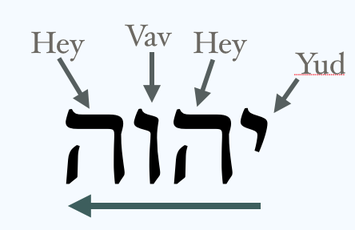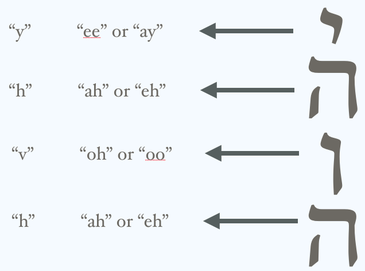
This week’s Torah portion is Va’eira. It continues the story of Moses’ conflict with Pharaoh over God’s demand that the Israelite slaves be freed. When Moses famously told Pharaoh, “Let my people go,” Pharaoh responded angrily by ordering the Israelites to make their bricks without straw. The Israelites became angry with Moses for making their work even harder for them. Last week’s portion ended with Moses feeling pretty disappointed in himself and pretty discouraged about convincing Pharaoh.
In the very first verse of this week’s Torah portion, God responded to Moses’ discouragement by saying, “I am the Lord. I appeared to Abraham, Isaac, and Jacob as El Shaddai, but I did not make Myself known to them by My name: Yud-Hey-Vav-Hey” (Exodus 6:2-3).
It’s hard to know what to make of this verse. In context, it appears that God told Moses God’s personal name – a name that was unknown even to the patriarchs, Abraham, Isaac and Jacob – as a form of reassurance. It is as if God was putting a divine hand on Moses’ shoulder and saying, “Don’t worry, Mo. I know that your mission seems impossible right now, but you should know that you have the best possible weapon in your corner in your conflict with Pharaoh. You have the God of heaven and earth as your best buddy. I’ll even let you call Me by the name that only My very best friends call Me. Do you trust Me now?”
Was Moses encouraged by the knowledge of God’s name? It doesn’t appear so. Moses next complained that God must have made a mistake in choosing him. Moses said, “I have a speech impediment. Why should Pharaoh listen to me?”
So, maybe knowledge of God’s name isn’t really a form of encouragement for Moses after all. Maybe God’s name has a deeper meaning. We should wonder: What is God’s name and why is it so important here? Let’s explore.

Over the centuries, some Christians have tried to restore the original Jewish pronunciation of God’s name. You may have heard some people use the name “Jehovah” for God’s name, but that is one hundred percent not the way God’s name was ever pronounced in antiquity. There is no way that any Israelites used a pronunciation even close to “Jehovah.” Sometimes, people use the pronunciation Yaweh or Yaveh to approximate the sound of God’s name. Those pronunciations at least have the advantage of using the right consonant sounds for Yud-Hey-Vav-Hey, and vowels that look like Hebrew vowels. However, it is highly unlikely that this was the ancient pronunciation, either.
The truth is, we don’t know how the name was pronounced in ancient times. The only person who was ever allowed to say God’s name was the High Priest of Israel, and he was only allowed to say it in the Temple on one day of the year – Yom Kippur – as part of an annual purification ritual. Once the Temple was destroyed by the Romans in the year 70 CE, there was no opportunity for anyone ever to say the name aloud, and the correct pronunciation was lost forever.
We can learn something about God’s name, though, just by looking at the letters. You may know that Hebrew – like all Semitic languages – is built on three-letter roots. Almost all verbs and most nouns are built on these roots. Looking at the letter combination Yud-Hey-Vav-Hey, a person familiar with Biblical Hebrew is likely to think, “That looks like a verb.”
Why? Well, it starts with the letter Yud, which is commonly an indicator of a future-tense verb. Also, it ends with a Hey, which is often at the end of a past-tense verb. In the middle, there is a Vav, which is typical of a present-tense verb. (Actually, there is no present tense in Biblical Hebrew, which is admittedly confusing. Let’s just say that it looks like a verb that is frozen into the present.)
So, what do we have? Yud-Hey-Vav-Hey looks like a verb form of the three-letter root Hey-Yud-Hey that is simultaneously in the past, present and future tenses. What is the meaning of the root Hey-Yud-Hey? That’s easy. It’s the verb “to be.” Here’s how it usually looks:
היה means “He was.”
הוה means “He is.”
יהיה means “He will be."
So, what is Yud-Hey-Vav-Hey? It must be something like “The One who was, is and will be.” I think you will agree, that is a pretty cool name for God.
It gets more interesting, too. Some people think that it is possible that the four-letter name of God, Yud-Hey-Vav-Hey, was never meant to be pronounced at all. They notice that all the letters of the name share an unusual quality. They are all letters that in Hebrew can serve as both consonants and vowels.

Hey can have the sound of the consonant “h,” or it can sound like the vowels “ah” or “eh.”
Vav can have the sound of the consonant “v,” or it can sound like the vowels “oh” or “oo.”
Hebrew was the first language to have any letters that could make vowel sounds. All written languages before Hebrew only had symbols for the consonant sounds with no letters at all for the vowels. It is possible, therefore, that the ancient Israelites gave God a name that only they could write – a name that consisted only of vowels. If that is the case, then God’s four-letter name is not pronounceable at all. It is just a flow of sounds:
EE AH OO AH
It is not really a name. It's not even a word. It is a sound, like the sound that the wind makes, that contains the meaning: “This is the God who cannot be explained or described in words, the God who has existed forever, exists in every moment, and who will exist for all eternity.”
So, why did God give Moses this name in the moment of Moses’ despair? Why is it that when Moses complained about the impossibility of his mission, God responded by uttering this strange, unfathomable name? Maybe God was telling Moses that he was asking all the wrong questions.
Moses wanted to know, “Why did You send me?” God’s answer is not to give a reason or a purpose. Rather God says, in effect, “That’s not how this works. I don’t create plans and go on missions the way that human beings do. I just am. I am the quality of justice. I am the quality of love. I am the quality of freedom. I am the quality of right in a world full of wrong. I am existence itself. I am not sending you. You are sending you, and I am the reason why you will do what is right and necessary. I was. I am. I will ever be. Now get going.”
Is there a lesson for us in this strange understanding of God’s name? I think so. We human beings have a habit in our moments of stress and uncertainty to raise our eyes up to heaven and cry out. Take a moment right now to think about the cries that you are sending up to heaven at this moment in your own life. Is it a cry to God that asks, “Why me?” Is it a cry that is demanding, “Help me”? Is it a cry that complains, “I can’t do what is expected of me”? We all have a cry because we all face issues and challenges in our lives that are bigger than we are. All of us have questions that we cannot answer. To all of these cries, God has an answer:
Yud-Hey-Vav-Hey. I am. I am here. I always was. I always will be. I am the sound of the wind purring past your ears that reassures you that, no matter what you face, there is a reason for your existence, a purpose for which you are here, values that will guide you to do the best you can.”
Now get going. Shabbat shalom.
Other Posts on This Topic:
Va'etchanan: Six Words
Shemot: Names

 RSS Feed
RSS Feed
